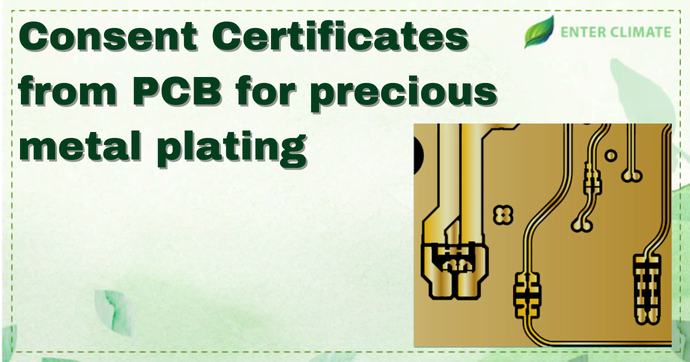Consent certificates from PCB for precious metal plating
 05 Dec, 2022
05 Dec, 2022 
Precious metals are naturally occurring elements known for their rare occurrence on the earth’s surface and high economic value. They are not as reactive as base metals, which are more common and less economically valuable, so they don’t oxidise nearly as quickly. They’re also relatively malleable. Elements used in the electroplating market in the country are rhodium, palladium, iridium, osmium, ruthenium, and, most importantly, platinum. The high economic value of these metals comes from their rarity and usefulness in various applications. Apart from the electroplating surface of metals like steel, copper, and nickel for different purposes, precious metal plating is used in the minting of coins, fine jewellery manufacturing, and many other consumer products. They have many industrial uses as well. While gold and silver are some of the most widely recognised precious metals, the metals from the platinum family also have applications in various industries due to their ability to catalyse reactions under milder conditions and high selectivity while remaining unreactive.
Precious Metal plating Business and their advantages
The electroplating process involves placing the metal (to be coated with the desired layer of the precious metal) in a liquid electrolyte solution that contains dissolved ions of the metal to be plated and some other chemicals. Passing direct current through the precious metal electrolyte solution causes the precious metal ions to attach to the object’s surface and form a metal coating. This phenomenon is known as electrodeposition/ electroplating.
Gold Plating Business
Gold is the most effective plating solution when the cost is not an issue. Gold Electroplating units have one of the highest demand in today’s electroplating market due to reasons like
Advantages:
- High-resistant to corrosion in extreme environments,
- An excellent conductor of electricity.
- The aesthetic look also contributes to its popularity
Silver Plating Business
Silver plating offers excellent protection from the corrosion action of acids and chemicals and is used in many products in the form of electroplated silver.
Advantages
- Excellent thermal and electrical conductivity
- One of the cheapest precious metals.
Platinum Plating Business
It is one of the rarest metals with various useful characteristics such as lustre, non-reactivity, catalytic properties etc. Platinum electroplating business is desired today due to reasons like
Advantages
- Platinum is widely used in many consumer products, especially jewellery and catalytic converters for conventional automobiles.
- Preferred over gold in many cases due to the higher melting temperature.
- Its durability makes it ideal for aerospace and automotive applications.
Rhodium Plating Business
Rhodium plating though not very common. But this metal is scarce and highly valued for its durability. It’s useful for a range of applications due to characteristics such as
Advantages:
- It is resistant to oxidation, corrosion and acids, even under extreme heat or high moisture levels.
- The majority of the rhodium is used in the production of catalytic converters for automobiles, a booming sector presently.
- Used in the manufacturing of Optic fibres, optical mirrors, thermocouple elements, Electrical contact material
Ruthenium Plating
Another precious and platinum-group metal used for electroplating is ruthenium. The unit that performs metal plating with platinum group elements uses this metal for electroplating due to advantages like
Advantages
- In demand due to the ability of the metal to enhance durability in extreme conditions.
- Ruthenium produces wear-resistant electrical contacts and data storage products (microchips, semiconductors, and read elements for hard disc drives).
Working of Precious Metal Plating Unit
Depending on the materials used, the precious metal plating units can apply thermal or mechanical operations during the treatment of metal surfaces. The unit can use different techniques for underplating depending on the metal. For instance, when plating with silver, an undercoating of copper or nickel can be applied. As electroplating with precious metal is a very delicate process due to the cost of the metal, extreme care is taken when compared to electroplating using other elements. Uniformity in the thickness of the metal coating desired finish of the product surface, and minimising wastage of metal are some of the concerns that determine the profitability of this business. Therefore the electroplating process involves a series of steps when compared to regular electroplating. The stages of electroplating are
- Preheating
- Polishing
- Ultrasonic cleaning
- Steam cleaning
- Electro-cleaning
Licence and Authorisation are needed to start a precious metal Plating Business.
Although most precious metals are inert, they still possess many characteristics that can harm the environment. The chemicals used in precious metal plating itself are a concern. Cyanide- and acid-based solutions, such as plating bath filters, resins, etc., all have the potential to cause harm to our environment if not disposed of properly. Therefore the law mandates any such industry involved in electroplating with precious metal.
Business Registration
Although not mandatory, business registration is an essential step towards setting up your own precious metal plating unit as it provides several distinct advantages, such as
- One can procure loans at a lower ROI if the business is registered because such a business has more credibility. Under the MSME Act[1], ROI can be as low as one to 1.5%.
- Depending on whether a business is micro, small, medium, or large, bank loans for small metal plating businesses are eligible for better tax rebates.
- Registered businesses are eligible for MAT carry forward for up to 15 years.
- You will be privy to government tenders for MSMEs if you are registered as one.
- Registration makes the business eligible for many rebates in seeding costs, such as patents and registered MSMEs getting licenses and certifications faster.
- The owner can be assured of business from central and state agencies if you are registered as an MSME.
- As an MSME, you will receive government aid for purchasing and upgrading equipment and marketing.
Consent Certificate: Precious metal plating businesses must obtain a Consent Certificate, also popularly known as Pollution NOC, from their State Pollution Control Board or Pollution Control Committee. Before starting the business. The Air Act and Water Act mandate that every electroplating unit that generates industrial wastewater must treat through ETP and other pollution control measures before releasing the wastewater. While Consent To Establish (CTE) must be obtained before establishing the unit, Consent to Operate (CTO) must be obtained before starting the operation. Documents required in this regard are
- Application Form (through SPCBs OCMMS Portal)
- Signed Undertaking
- Site Plan/layout plan (with a roadmap)
- Detailed Project Report.
- Details of processes and point sources of effluent /air emission/solid waste discharge.
- Details of finished products and manufacturing process, machinery, capital cost, source of water, water balance in the area, required quantity etc.
- Rent Proof /lease agreement
- Consent fee (as applicable)
- Balanced Sheet Certified by a CA
- Laboratory analysis report of the trade effluent and emissions.
- Copy of any environmental clearance (EC) or any other permission required from the state.
- Any other proof specified in the application.
Step by Step Process to get Consent certificates from PCB for precious metal plating
| Submitting Applications, documents and fee The entrepreneur has to register on the Online Consent Management and Monitoring System Portal of the concerned SPCB and apply for Pollution NOC under the category of the electroplating unit falls. | Document Scrutiny and Site inspection The SPCB official scrutinises the document and informs the applicant of any shortcomings in the application. A site inspection is scheduled, during which the declaration by the applicant w.r.t pollution control measures is inspected. | Issue of Consent Certificate/ NOC After the site inspector approves the site Inspection report after flagging any issues, the unit will be issued the Consent Certificate from PCB for precious metal plating by the Chairman/ Member Secretary. |
Additional Licences that may be required by precious metal plating Business
- Factory’s Licence
- Fire NOC
- Health Licence
- Tie-up with TSDF Operator
- Registration under Shops & Establishments Act
Market Analysis and Scope of Precious Metal Plating
According to some reports, the global precious metal plating market is projected to reach USD 312.01 million by 2028, expanding at a CAGR of 6.1% over the forecast period. The group’s demand for platinum and other elements for plating and manufacturing catalytic converters will be fuelling most of this growth. The gold plating business will witness the second-fastest growth, with a CAGR of 6.2% over the next few years. The increasing popularity of gold and its visual appearance among various age groups also keep the demand for gold-plated jewellery high.
Conclusion
Precious metals exhibit many properties that make them valuable for various industrial electroplating processes. The following factors have led to the popularity of precious metal refining in India. This metal category offers superior resistance against corrosion and wear and is highly malleable and conductive. Their inherent luminescence makes plating with these metals a popular option. Although precious metal is more expensive than other metals like nickel, chrome, tin, and zinc, their superior quality can usually offset the relatively high cost over time. The availability of specific metals can also impact the cost of the precious metal plating business. After obtaining a consent certificate from PCB for precious metal plating, the business has the potential to become profitable in the future under the present market trends and potential of this business.












